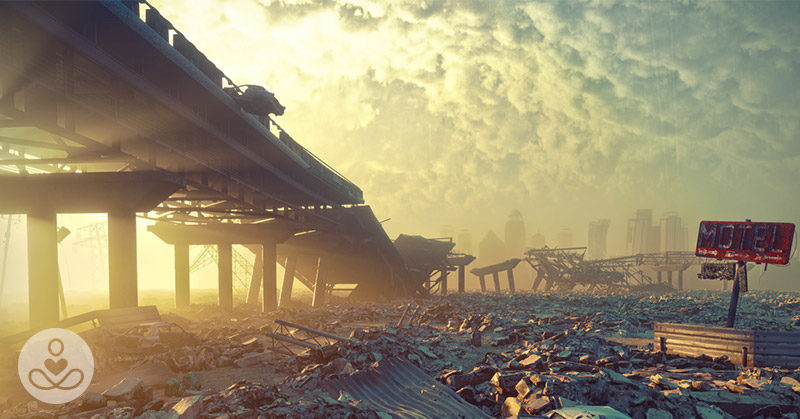We hear about “Doomsday” or “End Times” predictions all the time. Humans – from religious leaders to scientists – have made tens if not hundreds of these apocalyptic event predictions… none of which have ever actually happened. However, the most popular doomsday prediction at the moment is arguably coming out of Australia – and it wasn’t made by a flawed, faulty human.
In 1973, researchers from MIT developed a computer model that was processed (at the time) by one of the world’s largest computers. Faced with the challenge of predicting whether our planet and the way we are living in it is globally sustainable, the team looked to the computer model, nicknamed “World One,” to give them an answer. [1]
Its calculations ended up spitting out an answer that left and continues to leave many people wondering… Could this doomsday prediction actually be the one? In short, World One calculated that both population and pollution levels would cause a global collapse by 2040.
This Is the Real Prediction You Need to Worry About
“So, this is the situation,” said the ABC News reporter in 1973. [2] “As population increases, the quality of life decreases and the supply of natural resources decreases.”
That’s common sense, right? Most people would agree with what he’s saying but, according to World One’s calculations, what they don’t necessarily realize is that those decreases are set to start taking place by 2020… in less than two years.
“So, the year 2020, the condition of the planet starts to become highly critical and if we don’t do anything about it, this is what’s going to happen… The quality of life is going to go right back to practically zero. Pollution is going to become so serious… that it will start to kill people, so the population will diminish… [to] less than it was in the year 1900.” [2]
If World One’s doomsday prediction is true, we have a legitimate reason to be worried. It’s true that it took centuries to get to this teetering point and some people think it’ll take that many more before our planet is really in trouble. However, its calculations suggest that we may only have two to three decades left.
“At this stage, around about the year 2040, 2050, civilized life as we know on this planet will cease to exist.” [2]
Is It Too Late to Save the Planet?

Maybe, maybe not. According to the new UN-commissioned report from the Intergovernmental Panel on Climate Change, there is a small 12-year window to limit global warming to 2.7 degrees Fahrenheit (1.5 degrees Celsius). [3]
Although it seems like news outlets and environmentalists are making a big deal over a seemingly small number, try not to mistake size for significance.
With over 133 authors drawing from 6,000+ peer-reviewed scientific papers, the consensus is that – without a doubt – global warming needs to be reigned in. If individuals, corporations, and governments don’t all play their parts, we could very well be proving World One’s 1973 calculations correct.
To put it in perspective, the difference between 1.5°C of global warming and 2°C could mean this for our planet: [4]
- Marine fisheries would face double the declines
- Maize harvests would decrease by more than double
- Insects would see their ranges decline threefold (including vital pollinators)
- Sea levels would rise another two inches (causing coastal flooding for 10 million more people)
If we have any hope of preventing a global temperature increase, the entire world needs to be on the same page and coordinated down to a tee. But knowing anything about politics, pulling that off would require a miracle. As Vox blogger David Roberts pointed out: [5,6]
“Basically, stopping warming at 1.5C would involve an immediate, coordinated crash program of re-industrialization, involving every major country in the world. It would be like the US mobilizing for WWII, only across the globe, sustained for the rest of the century… Nothing like that has ever happened. Nothing even remotely similar has ever happened. There are currently no indications that any such effort is getting underway, and indeed the US is vigorously moving the other direction.”
Here’s What Consumers Can Do

According to CNN, there are three things you can start doing immediately to help limit global warming. [7]
- Eat about 30% less animal products
- Travel by bike, bus, or train instead of cars or planes
- Use a smart thermostat in your home and upgrade to more energy-efficient appliances
These actions may seem small, but together, they can have an immense impact on the longevity of not only our planet, but our species! And if we act quick enough, we may even be able to put of World One’s doomsday prediction for another few decades…

